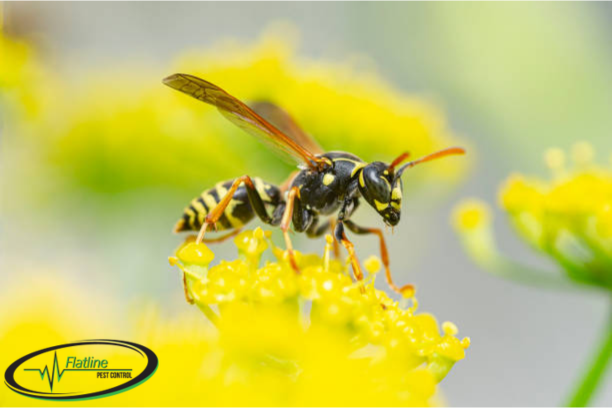Wasps

Wasps Information & Biology
LEARN MORE ABOUT WASPS
Wasps are common in Oklahoma, especially during the warmer months. While they’re often feared for their stings, wasps help control other pests and assist in pollination. However, when they build nests near homes or businesses, they can become a serious hazard.
Type of Wasps
Wasps are flying insects belonging to the order Hymenoptera, which also includes bees and ants. They can be broadly categorized into two main types:
- Social Wasps – Species like yellowjackets, paper wasps, and hornets live in colonies and are more aggressive when defending their nests.
Solitary Wasps – Includes mud daubers and other loners that don’t form colonies and are typically non-aggressive.
Wasps are easily identified by their slim bodies, narrow waists, and smooth exteriors. Unlike bees, many wasps can sting multiple times.
Wasp Control in Oklahoma
If you spot a wasp nest around your home—under eaves, in sheds, attics, or yard structures—avoid disturbing it. Flatline Pest Control provides fast, professional wasp removal throughout Guthrie, Edmond, OKC, Norman, and nearby areas.
Need wasp removal? Contact us today.
Frequently Asked Questions
Still have questions or can't find the answer you need? Give us a call at 405-466-8145 today!
Yes! Wasps help control other insect populations by hunting pests like caterpillars and flies. Some wasps also assist in pollination, contributing to the health of gardens and ecosystems.
Common Types of Wasps in Oklahoma
Yellowjackets
Small, aggressive, and often mistaken for bees.
They build nests in the ground, wall voids, or under structures.
Known for their territorial stings and defensive behavior.Paper Wasps
Named for their open, umbrella-shaped nests made from a paper-like material.
Less aggressive than yellowjackets, but will sting when threatened.
Often nest under eaves or porch ceilings.Hornets
A large and more aggressive type of wasp.
Bald-faced hornets and European hornets are found across the U.S.
They build football-shaped aerial nests in trees or on buildings.Mud Daubers
Solitary wasps that build small, tube-like mud nests on walls or ceilings.
Not aggressive and rarely sting.Cicada Killers
Large, solitary wasps that prey on cicadas.
It is common in Oklahoma yards and fields.
Intimidating in size but harmless to humans unless provoked.
Wasp Behavior & Diet
Wasps are opportunistic feeders. Depending on the species, their diets may include the following:
Insects and larvae – Many wasps feed on caterpillars, spiders, and flies, helping control garden pests.
Nectar and fruit – Adults are drawn to sweet substances, especially in late summer.
Carrion and food scraps – Some species scavenge for protein and sugar, which is why they’re attracted to trash bins, BBQs, and outdoor picnics.
Their role as natural predators makes them beneficial in small numbers—but a problem when they nest near homes.
Wasp Life Cycle
Wasps go through four main stages:
Egg – Laid by the queen in individual nest cells.
Larva – Fed by the queen or workers as they grow.
Pupa – Enclosed in a cocoon as they develop.
Adult – Emerges as a worker, male, or new queen.
Social wasps (like yellowjackets) form seasonal colonies, peaking in late summer across Oklahoma. Most die off in winter, with only new queens surviving to start colonies the following spring.
Solitary wasps, like mud daubers, do not form colonies. Each female works independently and provisions her own nest.
Are Wasps Dangerous?
Yes—some wasps can sting multiple times, and their aggression varies by species. For most people, stings cause mild symptoms like swelling or redness. But for individuals with allergies, anaphylactic reactions are a serious risk and require immediate medical attention.
Wasps usually sting only when they feel their nest is threatened—which is why professional removal is recommended.
Protect Your Oklahoma Home from Wasps
Don’t let wasps compromise your comfort or safety. At Flatline Pest Control, we help protect homes and properties across Oklahoma City, Guthrie, Edmond, and surrounding areas with expert inspection and removal services.
Wasp Prevention Tips
Seal garbage bins securely.
Avoid leaving sugary drinks or food outdoors.
Inspect rooflines, eaves, and attic spaces for early nest formation.
Remove fallen fruit from your yard.
Use wasp deterrent sprays or hanging decoys in problem areas.
⚠️ Never attempt to remove a large or active nest, especially if you're allergic to stings. Call Flatline Pest Control for safe, effective wasp control you can trust.
